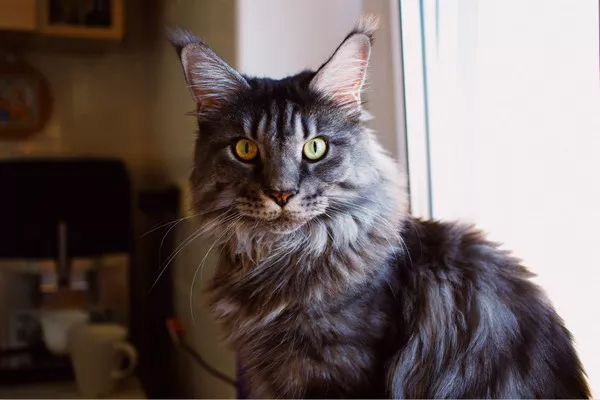Maine Coon cats are known for their large size, friendly nature, and luxurious fur. They are one of the most popular cat breeds in the United States and are cherished for their playful and affectionate personalities. However, one common question potential pet owners often ask is: “Are Maine Coon cats hypoallergenic?” This article explores the concept of hypoallergenic cats, specifically addressing whether Maine Coon cats fit this description.
Defining Hypoallergenic
To understand whether Maine Coon cats are hypoallergenic, it’s essential to grasp what “hypoallergenic” means. The term refers to the reduced likelihood of causing allergic reactions in sensitive individuals. Despite common misconceptions, no cat breed is entirely hypoallergenic, as all cats produce allergens. However, certain breeds may produce fewer allergens or shed less dander, making them less likely to trigger allergies.
Allergens in Cats
The primary allergens in cats come from their saliva, dander (dead skin flakes), and urine. Proteins found in these substances, particularly the Fel d 1 protein found in saliva, can cause allergic reactions in sensitive individuals. When cats groom themselves, the proteins in their saliva can dry and become airborne, leading to potential exposure for allergy sufferers.
Maine Coon Cats and Allergies
Maine Coon cats are often advertised as hypoallergenic, but it’s crucial to understand what this implies and whether it holds true.
Factors Contributing to Allergies in Cats
Allergies to cats can vary widely among individuals. Factors such as genetics, exposure levels, and immune response all play a role in how allergies manifest. For those who do experience allergic reactions, the proteins in cat dander are often the culprit.
The Role of Dander and Shedding
Maine Coon cats are known for their long, dense fur, which might suggest a higher likelihood of shedding and producing more dander. However, there is some debate among experts about their hypoallergenic status.
Do Maine Coon Cats Produce Fewer Allergens?
Research on this topic is limited, but anecdotal evidence suggests that Maine Coon cats may produce fewer allergens compared to some other breeds.
Coat Type and Shedding Patterns
Maine Coon cats have a semi-long to long coat with a soft undercoat and longer guard hairs. This type of coat could trap more allergens and reduce the spread of dander compared to breeds with shorter fur. However, the long fur can also lead to more dander if not properly groomed.
See Also: Why Siamese Cats Change Color?
Allergen Trapping Mechanism
Some studies suggest that the longer fur of Maine Coon cats may help trap allergens, preventing them from becoming airborne as easily as in cats with shorter fur. This could potentially make Maine Coon cats more suitable for allergy sufferers, though it does not eliminate the risk entirely.
Managing Allergies Around Maine Coon Cats
For individuals who are allergic to cats but are drawn to Maine Coon cats, there are steps that can be taken to reduce allergic reactions.
Regular Grooming and Cleaning
Proper grooming is essential to reduce allergens in a Maine Coon cat‘s coat. Regular brushing can help remove dander and hair before it becomes airborne. Additionally, keeping the cat’s living area clean by vacuuming regularly and using air purifiers can help manage allergens.
Limit Exposure and Allergic Responses
Another approach is to limit the cat’s access to certain areas, keeping the cat out of the bedroom or off furniture to reduce exposure to allergens. Using allergen-reducing products, such as special filters and covers, can also be beneficial.
Medical and Environmental Adjustments
In some cases, individuals may benefit from medical interventions or environmental adjustments to minimize allergic reactions.
Allergy Medication
Over-the-counter and prescription allergy medications can help alleviate symptoms in those who are allergic to cats. Antihistamines, nasal sprays, and decongestants can reduce the severity of allergic reactions.
Environmental Modifications
Modifications such as using hypoallergenic bedding, curtains, and air purifiers can create a less allergenic environment for individuals with cat allergies. Regular cleaning and maintenance of these elements are crucial to reduce allergen buildup.
The Personal Experience and Anecdotal Evidence
Many Maine Coon cat owners with allergies report fewer symptoms compared to other cat breeds. This suggests that individual experiences can vary widely, and some allergy sufferers may find that their symptoms are less severe when around Maine Coon cats.
Scientific Studies and Data
While there is anecdotal evidence supporting the idea that Maine Coon cats are less allergenic, scientific studies are sparse. More research is needed to understand the allergenic potential of different cat breeds, including Maine Coon cats.
Is Maine Coon the Best Choice?
When considering a hypoallergenic cat, it is important to choose based on individual tolerance and lifestyle. While Maine Coon cats might be less allergenic for some people, they are not entirely hypoallergenic.
Consulting with an Allergist
Individuals with cat allergies who are interested in bringing a Maine Coon cat into their home should consult with an allergist. An allergist can provide specific guidance and recommendations based on individual allergy profiles.
Conclusion: Maine Coon Cats and Hypoallergenic Status
In conclusion, Maine Coon cats are not entirely hypoallergenic. However, they may produce fewer allergens than some other cat breeds, and their longer fur could help trap allergens. Managing allergies involves a combination of strategies, including grooming, environmental adjustments, and medical interventions. Those considering a Maine Coon cat should do so with an awareness of their own allergies and consult with a healthcare professional for personalized advice.

























